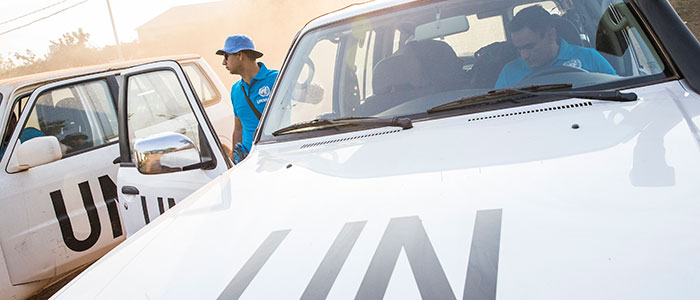UN car convoy aid delivery.jpg

UN vehicles
The ODI said that smaller, local and specialised organisations that might be better placed to respond to crises and disasters are pushed out of a western-dominated system as larger, international NGOs compete for funds and visibility.
A report published today by the ODI highlighted that local and specialised aid groups received just 0.2% of funding in 2014, despite having proven to be some of the most important sources of aid and assistance in crises.
As the humanitarian system buckles under the weight of today’s conflicts and disasters, which are increasingly frequent, complex and longer lasting, it has faced calls for a radical overhaul to make it once again fit for purpose.
But Christina Bennett, research fellow at the ODI and a co-author of the report, said examples of change seen so far have “amounted to nothing more than rearranging the deck chairs”.
She called for the sector to let go of “outdated behaviours” that prevent it from becoming more open and effective, rather than undertaking minor reforms that fail to tackle the “unhealthy power dynamics and incentives at the heart of the struggling aid system”.
As protracted conflicts and climate change have pushed the world’s humanitarian needs to unprecedented levels, resources have been unable to keep pace.
The ODI said organisational insecurity and financial uncertainty have led aid agencies to compete for growth and visibility rather than cooperate.
This can create inefficiencies. For example, during the Ebola epidemic this culture of competition compelled multi-mandate NGOs to set up Ebola treatment centres despite a lack of specialist health experience or expertise.
Combined with growing risk aversion, this has also led to the exclusion of smaller, local organisations, which are crucial in responding to modern day crises but no match for western giants in terms of battling for resources.
The report said the international NGOs have little incentive to relinquish some of their power and responsibilities to other organisations that could become yet another competitor.
Western NGOs then keep a near-monopoly on the sector, failing to connect with national and local groups as the system’s power dynamics, culture, financing and incentive structures create compelling reasons to remain closed, centralised and averse to innovation and learning, the report said.
They often fail to engage with and respect local authorities and cultures and privilege international technical expertise over local knowledge and capacities, it added.
Again during the Ebola outbreak, failure to engage and mobilise local communities seriously hindered the effectiveness of response, and even created animosity as traditional burial and funeral customs were overridden without appropriate sensitivity.
Local organisations then can be integral in forming a more effective, culturally informed response, and the report argues that the skills, capacities and experience they offer should not be confined to the margins of the system.
Sara Pantuliano, director of humanitarian programmes at the ODI, highlighted that other actors are also coming to the fore.
“Turkey and China are some of the most important growing humanitarian donors, and diaspora groups, businesses and regional organisations are crucial players in aid responses. The system needs a radical paradigm shift to adapt to the demands of the changing world,” she said.
The ODI report calls on the UN and other large international NGOs to let go of power and resources and enable national and local organisations to lead crisis response.
The needs of victims of crises should be placed above organisations' drives for greater resources and visibility, it continued, and the western system should acknowledge that there are myriad other sources of effective crisis relief than itself.
The report was published ahead of the first World Humanitarian Summit, organised by the UN and set to take place in Istanbul in May, which hopes to address some of the underlying problems with the ailing humanitarian system.













